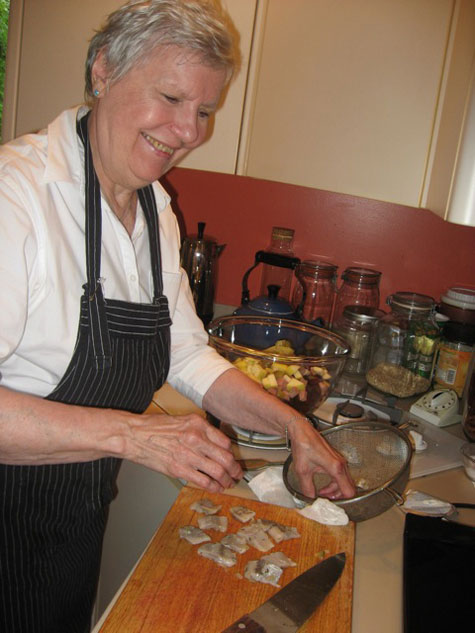
MATRIARCH Maili Kern preps an Estonian delicacy.
|
Last week while you were reading here about Portland chef Krista Desjarlais's efforts at Bresca, I was cooking with her mother, Maili Kern, who lives in the West End. She taught me how to make rosolje, an incredible roast beef and root-vegetable salad from Estonia (recipe at immigrantkitchens.blogspot.com). While we were cooking, she told an incredible story about Krista's ancestors. Here it is.
In the late 1930s in the Estonian village of Pärnu-Maa (on the Gulf of Riga), a young couple transformed a derelict farm into a dream of vitality. They had horses, sheep, cows, turkeys, dogs, pigs, geese, and abundant gardens abutting the Baltic Sea. He caught smelt in the ocean. She breaded, fried, and pickled them. She made bread with grains they had grown. Their four children plucked geese, sending soft feathers into the air. They witnessed a pig hanging, their parents making sausages, and their father putting them in a smokehouse he'd built himself.
One of the children, Maili, was three years old in 1941 when Germans came through the village. She hid in the root cellar while they stole her family's hams, grains, pigs, chickens, and a horse. In 1944, though, hiding wouldn't work again. Rather than wait to be done in by their communist countrymen, the young family packed the wool suits the woman had made by hand, and left that night in a rowboat. Paddling away from the shore, they left the farm, their country, and many relatives behind. Their favorite horse was, oddly, the hardest thing to part with, perhaps because it watched them go from the beach.
The family made it to an island in the Baltic Sea where they encountered a sailboat, called Juarka, filled with other escapees headed for Sweden. Young Maili, just six years old then, had awful seasickness on that trip, and then scarlet fever. On land, her family split, Maili going all by her self to face death with nurses who babbled Swedish in a quarantined hospital wing, and the rest of the family to a refugee camp. As Maili saw her own spirit depart, she heard Estonian coming through the window. Her parents and brothers and sisters were calling to her. Her father had found a job as a farm hand. They would all be okay.
After waiting eight years in Sweden for a visa to the United States, and a ship ride that seemed as long, the family arrived in New York City in the winter of 1952. Maili became a young woman, living with her large family in a ground-floor apartment with a closet-sized kitchen. One time, a man she liked arrived for a date. He walked in to find a strange smell and sight. Maili's mother was at the stove stewing a whole pig's head, its feet, allspice, bay leaf, onion, and carrot. While the young pair were on their date, Maili's mother finished the head cheese by skimming the broth, pulling tiny morsels of meat off the bones, adding gelatin, then putting the mixture into molds and refrigerating it. Later the family would eat fine slices of chunky cold cuts, dipping bites in horseradish or mustard. The suitor never developed a taste for it, but he did keep coming back for Maili. The two, Maili and Mike, would become Krista's parents. When asked how she became such a great cook, Krista responded, "My mother is a good cook. She's Estonian. Everything was made from scratch in our house."